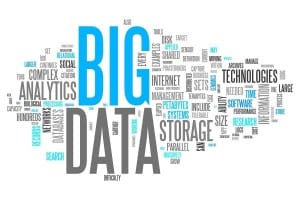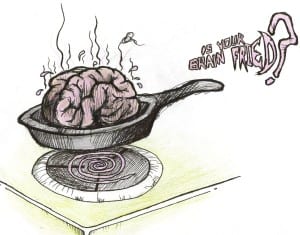 There is a lot being written these days about how “big data” can help emergency scene commanders improve situational awareness and, subsequently, make better decisions. While information (data) is critical to the formation of situational awareness, it is very easy for a commander to become overwhelmed with data.
There is a lot being written these days about how “big data” can help emergency scene commanders improve situational awareness and, subsequently, make better decisions. While information (data) is critical to the formation of situational awareness, it is very easy for a commander to become overwhelmed with data.
I say this often during my Mental Management of Emergencies programs: Volumes of data, under stress, is not a friend to good decision making. It is an enemy. Let’s start with looking at how the brain processes information.
Short-term memory
We don’t have to travel far down the neuroscience highway before we come to one of the first potential stumbling blocks of “big data” – short-term memory capacity. The average person (which encompasses most of us) can capture, process and remember about seven pieces of unrelated information (give or take two). This number has been robustly confirmed in research with participants worldwide from all walks of life.
Memory overload

What happens when a person reaches the capacity of their short-term memory? There can be several potential impacts. One potential outcome is a person may simply start forgetting some of the data. This can be demonstrated by giving a person a string of numbers to memorize. The more digits, the harder it will be to remember. Complicate the exercise with additional information interspersed among the numbers, throw in some stress, a little noise, and some flashing lights and watch the performance plummet.
Cant’ Remember? Make it up!
Another potential outcome, which is a complication of forgetting, is the person may begin to make-up data to replace the data that has been forgotten. Essentially, the brain does not like the confusion that can come from missing data. So, what does the brain do to compensate for this uncomfortable feeling? It starts making up data to fill-in for what is missing. The problem is that the individual won’t realize that the false data being created in the brain is made-up.
Data fatigue
 Another complication from too much data is fatigue. It can be very tiring to process the meaning of large volumes of data. Like muscles, when the brain gets fatigued it slows down. The fatigued brain can also start taking shortcuts and expediting decisions because it just can’t take any more data input.
Another complication from too much data is fatigue. It can be very tiring to process the meaning of large volumes of data. Like muscles, when the brain gets fatigued it slows down. The fatigued brain can also start taking shortcuts and expediting decisions because it just can’t take any more data input.
In defense of big data
Big data can be helpful if it can be quickly summarized and culled only when needed in formats that are easy to understand. Big data can also be helpful if the commander has someone who can run interference and only provide the commander with the requested data on an as-needed basis.
I have attended a number of presentations on technology and big data where much of the data I am being told would be available to the incident commander could be put into one of five categories:
1. Critical and urgent.
2. Important and urgent.
3. Critical but not urgent.
4. Important and not urgent.
5. Not important and not urgent.
As I have been told about the volumes of big data that would be at my fingerprints, much of it falls into categories 3-5. So long as access to this information is controlled, the decision-maker may not suffer from the challenges outlined above.
It is vitally important that the decision-maker not be fooled into believing that access to more data will improve decision making. What improves decision making is timely access to critical/important and urgently needed information in a timely fashion. If the decision-maker begins to access non-urgent information when timely and critical decisions need to be made, things can melt-down quickly.
Dr. Gasaway’s Advice
 When you go shopping for technology to improve access to information and to supplement your good decision making, don’t become starry-eyed when the vendor shows you all the layers of information that you will be able to access. Think about what information you need to make urgent decisions. Make sure you can access that information easily without a lot of extraneous data that can complicate your processing and comprehension of the data.
When you go shopping for technology to improve access to information and to supplement your good decision making, don’t become starry-eyed when the vendor shows you all the layers of information that you will be able to access. Think about what information you need to make urgent decisions. Make sure you can access that information easily without a lot of extraneous data that can complicate your processing and comprehension of the data.
Ideally, the technology that provides you access to big data would be customizable on your end so you can create shortcuts to the most important information that aids in critical, timely decisions.
If your organization has adequate staffing at emergency scenes so you can assign someone to access and filter the big data, that could help reduce the sense of overwhelm on the commander.
Move forward with cautious optimism. Technology is giving us access to data at volumes and speeds unlike any time ever in history. This can be good and it can be bad. Simply because advances in technology allow us to capture and summarize big data, doesn’t mean the decisions, under stress, will improve if the big data overwhelms the commander.
Action Items
 1. Discuss a time when you were overwhelmed from too much information and it impacted your decision making.
1. Discuss a time when you were overwhelmed from too much information and it impacted your decision making.
2. List and discuss what data is critical and important to making timely decisions at emergency scenes? (Note: This list will vary based on various types of emergencies.)
3. Discuss your strategies to avoid being overwhelmed by big data.
4. Discuss strategies for how big data access can be applied to emergency scenes.
_____________________________________________________

If you are interested in taking your understanding of situational awareness and high-risk decision making to a higher level, check out the Situational Awareness Matters Online Academy.
CLICK HERE for details, enrollment options and pricing.
__________________________________
Share your comments on this article in the “Leave a Reply” box below. If you want to send me incident pictures, videos or have an idea you’d like me to research and write about, contact me. I really enjoy getting feedback and supportive messages from fellow first responders. It gives me the energy to work harder for you.
Thanks,

Email: Support@RichGasaway.com
Phone: 612-548-4424
SAMatters Online Academy
Facebook Fan Page: www.facebook.com/SAMatters
Twitter: @SAMatters
LinkedIn: Rich Gasaway
Instagram: sa_matters
YouTube: SAMattersTV
iTunes: SAMatters Radio
iHeart Radio: SAMatters Radio
